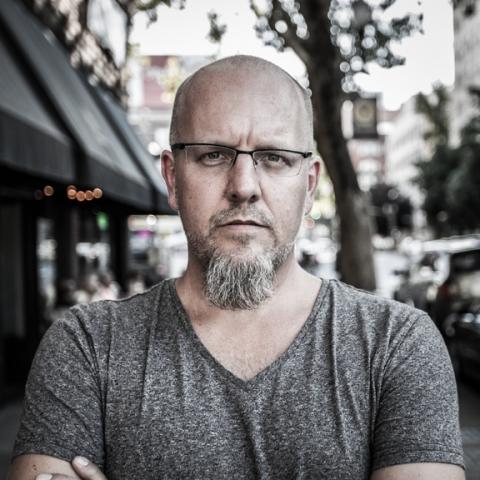
Christian Piatt is an author, blogger at Patheos and founder/cohost of the Homebrewed CultureCast podcast, where he focuses on the intersection of faith and popular culture. His latest book, “Leaving A-holiness Behind,” is available now, and his next book, “Surviving the Bible: A Devotional for the Church Year 2018,” will be available November 1, 2017.
Posts By This Author
Hearts in the Trash (Day Two)
It turns out that packing all the belongings you need for at least three months into the back of a Prius is a challenge. Of course, being a guy it’s the kind of challenge that makes life worth living. Anyone who has ever been a Tetris junkie can appreciate the exhilaration of fitting forty-seven differently shaped items into a space made for about half the volume. Yes, I had to jump up and down on the back hatch, and several keepsakes are undoubtedly smashed beyond recognition. But by God, I got it all in there.
While I was basking in the glory of being a master packer, my family was busy feeling. Amy kept up her “four cries an hour” regimen, while three-year-old Zoe melted down whenever she realized this toy or that piece of furniture was not going with us after all. It’s a strange feeling, leaving most of our valuables behind, but for me, it’s kind of liberating. I love the idea of grabbing what I can carry and heading west until I reach the edge of the earth.
Apparently my family doesn’t share the same romantic bug. They like stability.
“This is the longest I’ve ever lived anywhere,” said Amy, wiping tears aside. “This is home.”
“Yeah, but we’re taking home with us,” I said, trying in vain to employ the typically male strategy of emotional deflection.
“Taking it where?”
“Good question.”
Lost and Found Life (Day One)
Last Sunday, we looked around the sanctuary, every seat filled, smile mixed with tears, and each one bearing a story about how they got there and why they stayed. Stories of recovery from addiction, healing in its many unexpected, mysterious forms, lost hope resurrected by a community of faith who loved them through it. It was beautiful.
And then we said goodbye and left.
It seems like all we’ve been doing lately. To friends, family, and even those people who acted heartbroken that we’re moving on, even though we don’t exactly remember being friends with them. turns out some people feed on the drama of “goodbye” like it’s some strange narcotic. Reminds me of Helena Bonham Carter’s character in Fight Club who got off on other peoples’ misery in an endless chain of twelve-step groups she crashed.
Global Belief Survey Compares Faith of Nations
The University of Chicago recently performed an exhaustive survey of the beliefs of people in 30 countries around the world. There were a few surprises in it, and I also struggled a bit with the entire structure of the survey.
Though I knew there was a large (and growing) disparity between those claiming some faith in the United States and those attending a church, I fully expected that the number of die-hard faithful would be much lower. After all, a previous study some years ago by the Baylor Institute for the Studies of Religion found a direct correlation between church attendance and one’s confidence in the existence of God. It would be interesting to revisit that question, given these new results, to see if that trend is still happening, or if there’s a resurgence in American faith in God, regardless of the still-declining church numbers.
Drive-Thru Prayers to Drive-In Church: Is Religion Lost?
I talk to folks a lot about what role the church should have in contemporary life in serving people. There’s the trend of “third space” ministry, getting out of the four walls of the church building and meeting people in different, typically “secular” contexts.
One defining trait of postmodern life is the blurring of previous boundaries. Just like work now can go with us beyond the cubicle, people think about faith in different terms than just sitting in a sanctuary on Sunday morning. There are entire ministries that do all of their work online, broadcasting services, or recording them for people to view on demand. There are blogs (like mine) whose authors consider what they do to be a ministry, though not in the typical sense of the word.
'Angry Queers' taking on Driscoll, Mars Hill the Wrong Way
I had a stew of emotions when I read about an activist group in Portland calling itself the “Angry Queers” vandalizing a satellite church of Mark Driscoll’s Mars Hill network. Neighbors in the area reported seeing a handful of young people in black masks smashing stained glass windows and damaging other property on the church campus early Tuesday morning. A group called the “Angry Queers” sent a letter to a local news affiliate taking responsibility for the damage.
I get the anger. I feel that anger when I read things that pastors like Mark Driscoll say about the LGBT community. It’s wrong and it should be confronted publicly.
But please, for the love of God and one another, not like this.
Taking 'Jesus Christ' Out of the Bible
A new translation of the Bible called “The Voice” (no, Cee-Lo makes no appearances in this one), published by Thomas Nelson, has created quite a buzz. The discussion is not so much around what is in the newest version, but rather what’s left out.
According to a recent article on the Huffington Post, the words “Jesus Christ” do not appear anywhere in the New Testament. And for some, this is tantamount to heresy. The publishers point out, however, that “Christ” was not, in fact, Jesus’ last name.
NRA Spokespeople Not Helping the Cause
I know plenty of reasonable, kind, law-abiding people who carry guns. One guy, a pilot, needs to be able to handle a firearm secured in the cockpit as part of his job. Others are hunters, police officers and former military. For them, the gun is not a status symbol. It isn’t a tool used to intimidate or threaten. Unless you know them well, you probably wouldn’t ever know they even carry guns.
And all of them are members of the National Rifle Association.
However, like many groups (organized religion included), these are not the spokespeople for the whole body that we tend to see. Rather, it’s the bombastic wing-nuts like Charlton Heston who can certainly grab headlines, but not necessarily always in the way the constituency would prefer to be represented.
What To Do About “Radical Feminist Nuns”
It’s not exactly headline-worthy news that many Catholics actually hold personal beliefs that don’t line up with church doctrine. It does get a little more interesting, however, when an umbrella group for 57,000 American nuns is called to the carpet for straying from Church teaching.
Reportedly, the nuns are promoting ideas on issues like abortion and homosexuality, among others in their programs that the Church condemns.
The ladies in black and white have gotten into some hot water with the Vatican, whose representatives claim the nuns are practicing “certain radical feminist themes incompatible with the Catholic faith.”
Death by Faith Healing: A Church-State Separation Dilemma
The sovereignty of religion in the United States is a thorny issue when it comes to state powers. But most Americans can agree that there are lines that even the Church cannot cross.
The problem is that sometimes that realization comes too late.
Sixteen-year-old Austin Sprout is the most recent victim of such religious transgressions. Oregon’s Register-Guard recently reported that Sprout’s parents declined medical care for their son, opting instead for prayer to ensure his recovery from an undisclosed but commonly preventable illness. He died in spite of their faithfulness.
Sprout’s father, Brian, reportedly died of sepsis five years ago when the family refused medical treatment for his medical injury, opting for faith-based healing. The family attends The General Assembly Church of the First Born, a congregation the Huffington Post notes is “known for their practice of faith healing.”
Social Media and Our Epidemic of Loneliness
The recent cover article in The Atlantic called “Is Facebook Making Us Lonely?” (Stephen Marche) is worth sharing. It’s about a growing trend of social isolation and loneliness in our culture, despite innumerable social media connections we use to counteract that problem.
As good as the article itself is, the title is misleading, I think. Though I agree with each of the points made about the epidemic levels of loneliness we’re experiencing, I would argue that sites like Facebook, Pinterest and Twitter are byproducts of this isolation, rather than the cause of the loneliness.
When they become problematic is when we rely on them to be a surrogate for real, face-to-face relationship. I consider that akin to sitting on your couch and taking stimulants to lose weight, rather than changing your exercise and diet habits. Sure, you may get some results, but at what greater cost?
From “Mad Men” to “Girls” – The Evolution of Sexism
Two things leap off the screen while watching the debut of “Mad Men;” first, everyone drinks and smokes. All the time. Second, women are treated like so much property, and though they seem complicit in their subjugate role, they also have a racket of their own going, using their feminine wiles to work their way up alongside the mean of greatest means and power to enjoy both by association.
It’s hard to believe only two generations ago that an executive was within his purview to suggest to his secretary that she hike up the hem of her skirt a bit and fetch him some fresh ice for cocktails with the boys.
Or is it?
More Church Sign Epic Fails
When I Think of Heaven
The popularity of Colton Burpo’s story, called Heaven is For Real,, about experiencing heaven while undergoing surgery raises very mixed feelings for me. On its own, it’s a nice story. It presents a hopeful outlook of what happens to us after death, and there’s little in the short tome to get worked up about.
But it’s a story. It’s an account retold by a pastor’s son while under heavy anesthesia, offering imagery of the afterlife that props up nearly every stereotypical description of heaven, from the clouds and halos to angels with wings. Though it hardly resonates with my understanding of heaven, I don’t have a problem with folks embracing such an idea of what heaven is for them.
Childless Woman: 'I Wanted That Suffering'
I was pretty sure my parents were insane when I was a kid. It never made any sense to me when they’d talk about how they’d rather have something bad happen to them instead of to me.
Well folks, that makes three of us, I guess. Being the good little narcissist, I agreed that I didn’t want anything to happen to me, damn the consequences to anyone else. We all go through that developmental stage; some grow out of it and others, not so much. It takes time, experience, wisdom and a broadening of perspective to understand that the avoidance of suffering, in itself, is not the end-game of life.
It’s even harder to understand suffering as a gift.
Young Adults: Forget Church, Follow Jesus
The teachings of the church are seen as devalued. This doesn’t have so much to do with the inherent importance or validity of what is being said, but rather it’s a reflection of the value of information overall. It’s really a matter of supply and demand. Abraham Lincoln probably wouldn’t have walked so far to get a book from the only area library, after all, if he had Wikipedia and Google Books at his fingertips. Most anything being said, taught or preached about in a church on Sunday can be found somewhere else, wherever and whenever we want it. Why wait?
The institutions have outlasted their original purpose. Most of our churches were built when populations were static. People didn’t divorce, change jobs and move around like they do now. This mobility, combined with the diversification of networking opportunities, online and through other means, puts bricks-and-mortar institutions in an awkward spot of hoping people find them where they are. And much of the outreach efforts of church is still an attempt to get people “in the doors.” But the fact is that most young adults don’t particularly care.
The Problem With the Tebow Easter Extravaganza
I didn’t see Tim Tebow’s Easter Sunday appearance in Texas. For one, it’s in Texas and I’m not. Plus I kind of have a standing gig on Sundays. But more than that, I was irked when I heard about the big event being planned on, of all days, Easter Sunday.
For the most part, I admire Tim Tebow, even though I don’t agree with him theologically very much. He made one statement about getting back to what this country was founded on, “One Nation, Under God,’ which seriously rubbed me the wrong way (HINT: the phrase “Under God” wasn’t added to the Pledge of Allegiance until the 1950s.), but for the most part, he was the upstanding Christian athlete people have come to expect.
What’s So Good About Good Friday?

Religious procession on good Friday in Stuttgart-Bad Cannstatt, Germany. Via Wiki Commons (http://bit.ly/HUeRVg)
I’ve never liked the fact that we call the day on which we remember Jesus’ crucifixion “Good Friday.” What’s so good about it anyway? Personally I find the entirety of Holy Week – save for Easter – pretty depressing. Sure, the days are getting longer and things have started to grow all around us, but until Easter, the focus of the week is the suffering and death of an innocent man.
It turns out that, although plenty of folks have their own explanations, nobody actually knows why we call it Good Friday. I think the Germans are spot-on by calling it Karfreitag, which means “Suffering Friday.”
Figures the Germans would be more content to sit with suffering than the rest of us. They’re so serious! But I digress…
Compassion Wins: A Longtime Atheist Becomes Christian
Patrick Greene, a lifelong atheist known for his public stands against Christianity, recently announced that he has become a Christian.
There are lots of ways to look at this. Some Christians may take this as validation that they were right and atheists were wrong. Some might consider it a point for the good guys. But such attitudes further the divide between people with more in common than not. Aside from that, it misses the most important point.
Six Plagues of Our Time
We had our fourth annual Passover Seder at Milagro last night. I know, you’re thinking, “what are a bunch of goyim doing celebrating a Jewish tradition?” Given that the central act of our worship service every week – communion – was first introduced by Jesus at his last Seder, we figure if it’s good enough for Jesus, it works for us too.
For the most part, it was a party. But there’s a point at which the leader reads off the ten plagues described in Exodus, none of which is pleasant. For each plague, you dip your finger in a cup of wine and mark the edge of your plate with a crimson dot as a reminder throughout the meal of the suffering experienced by those in captivity.
It’s not exactly a crowd-pleaser, but it’s a valuable symbol, placing in context the joy, food and fellowship that dominate the rest of the evening. Go ahead and enjoy, toast and eat well, but don’t forget.
It got me thinking about what the plagues of our day would be if I were to list them. No, I don’t ascribe to the belief that God sends such horrific episodes upon us as punishment, but I do believe that our free will affords us enough rope to hang ourselves at times, so to speak. Our current plagues are more existential, but the byproducts are often painfully tangible.
Letter From a “Demon Possessed” Woman
It’s interesting how certain patterns emerge in our lives sometimes. Part of it, I expect, has more to do with awareness than actual coincidence, like when I start seeing blue Pruises (Prii?) everywhere after buying one.
Yesterday I got a book in the mail called Breaking Their Will: Shedding Light on Religious Child Maltreatment by Janet Heimlich. And a couple of days before that I got an email through my website, which I’ll share in a minute.
A while back I wrote a few pieces about my son, Mattias, who is dealing with Asperger Syndrome. The first was about when we told him about his special condition, and the second was about the less enjoyable side of Aspergers: the meltdowns. Third was one about his tendency to obsess his way into an emotional knot.
More than just telling the story of a rather remarkable kid, I try with these pieces to work through how to deal with such challenges, and hopefully, how to find God in the middle of it all. I think that both those affected by special needs and those who care for them need the assurance that they’re not the only ones, and I know I always find encouragement from letters I get from folks who appreciate what I’ve shared.

















